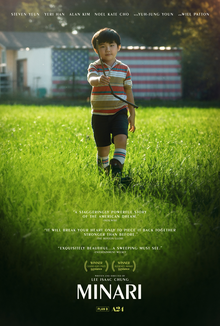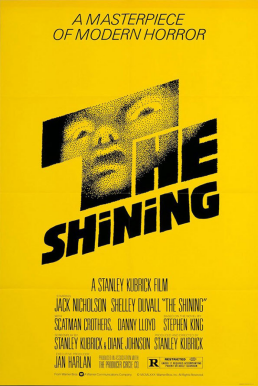Minari ★★★☆☆
Film editor Oliver Weir discusses the Best Picture nominee "Minari". The latest work by Lee Isaac Chung (director of the fabulous "Munyurangabo" (2007)), Minari follows the Yi family as they start from scratch, having moved from bustling California to the forests of rural Arkansas.

Minari has almost exclusively been billed by critics as a film ‘about the immigrant experience’. In terms of the more mechanical elements of the movie (mainly the setup of the plot), this is certainly true. The Yi family, having recently moved from California, begin their new life in Arkansas, secluded in the country, ‘simply miles away from the nearest lemon’, as Sidney Smith once remarked. Monica (played by Han Ye-ri) has reservations about the family’s new unembellished, “hillbilly” way of life. On the other hand, her husband Jacob (played by Steven Yeun) is enthralled by the potential that a new start affords. When Monica mockingly suggests that their relocation was prompted by the quality of the dirt in Arkansas, Jacob replies, without pretence, 'this is the best dirt in America’. And on they go; having to make do with a handful of seeds and a house that has wheels. At first, the Yi’s little slice of the Arkansas backcountry is colourful but diegetically bare; there are no people, there’s no running water, no source of food, and no adequate source of income. In the first half an hour or so, Jacob, on whose recommendation the family moved, lays out the vision he has for his family. He is optimistic, and sees within that great expanse of soil and weeds a better life for them all. Monica, on the other hand, wears an unrelenting look of apprehension—a look that Jacob fatefully shrugs off as muted excitement; but Monica is not waving, she’s drowning.
The parable-ish nature of the opening sequence, as well as the vulnerability that Yeun and Han bring to their roles, has combined to create something that transcends the ethnic and religious details of the immigrant experience
The opening of Minari, and the bulk of its ‘immigrant experience’ connotation, is developed through Jacob. He is a romantic at heart; at one point he even dons a red hat, white vest, and various other ‘American farmer’ apparel. Importantly, though, he is not drunk on his vision. Quite the opposite; he is sober, and understands that a life in America is built, piece by piece, through pragmatism, hard work, and a generous helping of good fortune. He clings to the traditional familial values of honour and responsibility, but he’s also ensnared by an often ruthless autonomy. This latter adherence feels arbitrary, even selfish at times. When the family is thriving, it is sometimes unclear whether Jacob’s happiness is primarily derived from the happiness of his family, or whether it arises because he has proved something to himself. When we see the idyllic image of him riding the new tractor into the fields, with his wife and children walking excitedly behind, is he smiling at the future that sits on the horizon, or is he smiling because he will be the sole precursor to that future? “They [the children] need to see me succeed at something for once”, he tells Monica; and in that line of dialogue is the answer to the question. What he fears most is disappointing himself and his family, and of being no use to anyone—a sentiment that recurs in his work each day as a chicken sexer, wherein the male chicks are discarded in an instant, only to reappear in the thick black smoke that billows out the chimney. This compelling opening sequence—which is effectively a character study of Jacob—perfectly captures the familial strain and anxious hope of beginning in America. Indeed there seems to be unanimous and resounding adulation for this part of the movie, especially from many first and second generation immigrants who are familiar with the hardships of life at square one. The parable-ish nature of the opening sequence, as well as the vulnerability that Yeun and Han bring to their roles, has combined to create something that transcends the ethnic and religious details of the immigrant experience. While this is the most lauded aspect of Minari, and has occupied almost all the reviews I have read, the movie itself moves away from these themes in the second and third acts. The arrival of Monica’s mother, Soon-ja (played by Yuh-Jung Youn), signifies, I think, the point in the movie at which a thematically richer subcurrent of duty and sacrifice (especially as they pertain to grandparenthood) emerges. Make no bones about it, Yeun’s performance is poignant throughout, but Jacob, I maintain, is not. Jacob is as dogged and focussed at the end as he is at the beginning. Neither the sight of his stock going up in flames, nor the atrophy of Monica’s love for him appears to provoke more than a single tear. Within the chaos of the Yi’s new situation—in which there always seems to be an unseen danger out there, looming over them, threatening to spoil their paradise, be it the snakes in the creek, the tornado they narrowly avoid, the fatal uncertainty of David’s heart condition, or the greengrocers who will not buy—Jacob retains an abiding resolve. He serves as the narrative background, out of which the other members of the family emerge. In Jacob’s assuredness, Monica’s doubt flourishes, and in Jacob’s precision, David’s playfulness thrives. Jacob essentially throws down the gauntlet in the first half hour, and the others react for the rest of the film.
Yuh-Jung Youn steals every scene with her terrifically playful portrayal of a grandmother mending a family through discernment and wit and charm
Critics and awards groups appear to be realising the strength of both Yuh-Jung Youn’s performance and the theme of grandparenthood within Minari (she won a SAG award on Monday, and I wouldn’t bet against her to take the Oscar later this year). Yuh-Jung Youn steals every scene with her terrifically playful portrayal of a grandmother mending a family through discernment and wit and charm. Soon-ja is the character on whom everything hinges. She teases out, purposefully or not, both Monica, David, and Anne’s vulnerabilities. Then, one by one, purposefully or not, she solves each of those aforementioned unseen problems: she gives David the slack to run within his limits and absolve his fear of death; she bestows her greatest gift to Jacob and Monica when she accidentally destroys Jacob’s stock; and down by the creek where the snakes abound she plants the titular minari. (While at first the solution to the stock problem may not seem like one, it is only through the destruction of the stock that Jacob and Monica begin to rebuild their relationship.) In her old age and undeniable state of decline these are her parting gifts to the Yi’s. Her role is to work behind the scenes, putting each thing in its place, so that the family ventures on towards that cloudless horizon. If she can spur each of them on one final time, just as she did to Monica when she was younger, then she can die happy knowing that one day they’ll all get there; and not on the back of Jacob or of Monica, or any one of them in particular, but instead on the back of something familial and unified, a force that is appreciable yet unspoken.








